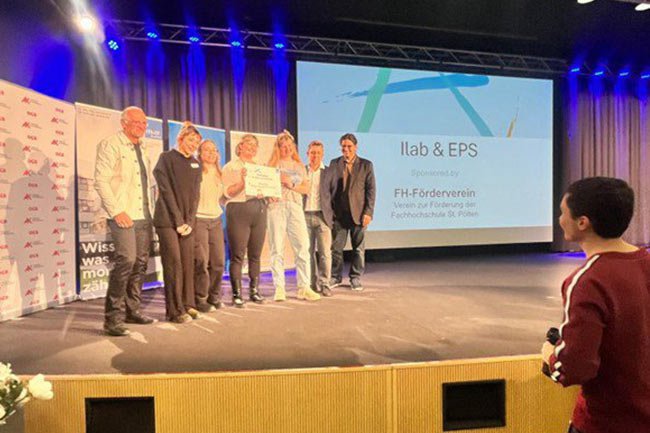Successful iLab semester
‘Bridge the Gap’ wins project vernissage
The UAS project vernissage took place on 14 January - an inspiring highlight of the semester at which innovative projects were exhibited and awarded prizes. The ‘Bridge the Gap’ team“, made up of Veronika Linhartova, Tamina De-Silva, Franziska Engel, Aigerim Orozakunova and Theresia Lichtenwagner, stood out in particular, winning in the iLAB (Interdisciplinary Lab) and EPS (European Project Semester) categories. Their project impressed with a workshop and a board game designed to promote an inclusive environment for AFAB (Assigned Female at Birth) trans-masculine people in gynaecological practices.
The project launch was the culmination of an intensive and instructive iLab semester in which 24 students from different countries and study programmes took part. The aim of the programme is to promote interdisciplinary collaboration and develop practice-oriented solutions for socially relevant challenges. Using the design thinking methodology, the students started in twelve teams, which were reduced to six teams after the first phase of empathy work. After further rounds of prototyping and refinement, four teams of five to six members each worked on their projects until the end of the semester.
A semester full of challenges and growth
The group behind ‘Bridge the Gap’ describes the project vernissage as an emotional highlight. ‘It was not only a great presentation of our work, but also an opportunity to get direct feedback from the visitors,’ says Veronika Linhartova, a member of the winning team. In particular, the dialogue with experts and interested parties reinforced the team's belief in the relevance of their topic.
‘At the beginning, it was a challenge to concretise our ideas and grow together as a team,’ reports one participant. ‘But through the iterative work and the application of agile methods, we were able to develop not only our project but also our personal skills.’
The students emphasise that during the semester they not only deepened their technical skills, but also their social skills such as communication, teamwork and conflict resolution. ‘I would recommend this semester to anyone who wants to try something new and gain practical experience for the future,’ was the unanimous opinion of the group.
Supervision and support
The ‘How Might We’ challenge, which was the basis for the success of the project, was submitted by Martin Ernst, Junior Researcher in the Inclusive Digital Community Care Research Group at CDHSI. Under Martin's supervision, the group concretised the question: ‘How can we reduce experiences of discrimination against LGBTQIA+ people in the healthcare system?’ This challenge was tackled creatively and in a solution-orientated manner over the course of the semester using agile design thinking methods.
Martin Ernst emphasises: ‘It was an enriching experience to accompany the group and see how such a well thought-out and practical project emerged from an initial idea.’ The focus was on giving the students room for their own initiative and supporting them in their development.
An inspiring example of interdisciplinary learning
The iLab semester and the project vernissage impressively demonstrate how interdisciplinary collaboration, creativity and methodical work can produce innovative solutions to social challenges. The success of ‘Bridge the Gap’ is not only a confirmation of the relevance of the project, but also an inspiring example of what can be achieved when students from different backgrounds combine their strengths.
